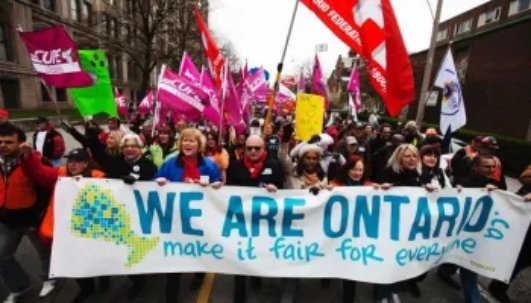Make It Fair: The Push for Stronger Labour Laws
In 2016, Ontario workers faced a big problem. More jobs were part-time, temporary, or contract work. Steady full-time jobs with benefits became harder to find. Many workers had unpredictable schedules, low pay, and little protection under old labour laws.
This situation led the Ontario Federation of Labour (OFL) to start the “Make It Fair” campaign. They wanted to fix Ontario’s workplace rules that hadn’t been updated in over 25 years.

“Ontario workers are increasingly trapped in precarious part-time, temporary, contract and subcontracted jobs,” the OFL said when starting the campaign from their headquarters at 15 Gervais Drive in Toronto. They noted that employers in all sectors were “driving down wages and working conditions.”
What Started the Campaign
The Make It Fair campaign began when the Ontario government announced the Changing Workplaces Review in 2015 – the first big look at provincial labour laws in a generation. This review created what the OFL called a “once-in-a-generation opportunity” to update the Employment Standards Act and Labour Relations Act.
The timing was right. With the government reviewing workplace laws, the Make It Fair campaign pushed for specific changes to protect vulnerable workers and make joining unions easier.
The campaign had clear goals: good work standards for all Ontario workers, fair pay, better scheduling rules, and making it easier to join unions. These goals addressed the growing job insecurity many workers faced across Fair in Ontario initiatives.
The Role of the Ontario Federation of Labour

The OFL brought major resources and organizing power to the campaign. Founded in 1957, the OFL represents over one million Ontario workers from 54 unions across more than 1,500 locals, making it Canada’s largest provincial labour federation.
The OFL made Make It Fair its main campaign while working closely with the “Fight for $15 and Fairness” movement. This partnership united labour advocates pushing for both higher wages and stronger workplace protections.
The OFL also pushed for these changes through budget advocacy. OFL President Chris Buckley stated: “For millions of Ontario workers – who find themselves in a constant state of uncertainty – maintaining the status quo is not an option. Meaningful changes to the Employment Standards Act and Labour Relations Act are needed.”
With three full-time officers, an Executive Board of 34 vice presidents, and connections to over 40 labour councils, the OFL could talk to elected officials while building local support through regional organizing hubs.
Precarious Work: What the Survey Found
To strengthen their case, the OFL did a Precarious Work Survey that gathered direct stories from workers about their experiences. The OFL Precarious Work Survey – Make It Fair became a crucial tool for documenting real-world challenges.
“We want to hear your thoughts on precarious work!” the OFL announced when starting the survey, aiming to document how unstable jobs affected people’s lives.
The results confirmed what many already knew: unpredictable hours made it impossible to plan finances, temporary contracts created constant job insecurity, and many workers struggled without benefits or sick days. These personal stories became powerful tools when talking to provincial lawmakers.
The Campaign’s Main Priorities
Fix Union Rules
The campaign identified several barriers preventing workers from forming unions:
- Push for card-check certification (letting workers form unions by signing cards instead of needing a second vote that employers could influence)
- Giving unions access to workplace information like employee lists
- Creating fair voting processes away from the workplace where employers couldn’t pressure workers
“People cannot make an informed decision about the right to join a union if they are not able to hear from the union,” the OFL explained in discussions about what is the Labour Relations Act reform.
Protect Workers’ Rights
Make It Fair fought for stronger protection of basic labour rights:
- Stop contract flipping (when employers cancel and rebid contracts to avoid union obligations)
- Provide first-contract arbitration for new unions
- Ban replacement workers during strikes
- Protect workers from employer retaliation
The OFL framed these as constitutional issues: “Under the Canadian Charter of Rights and Freedoms, every Canadian has the fundamental freedom to associate for the pursuit of collective workplace goals.”
Raise Work Standards
Beyond unions, the campaign pushed for better workplace standards:
- Equal pay for equal work regardless of job status (part-time, temporary, or full-time)
- Seven paid sick days per year
- Three weeks’ vacation (bringing Ontario in line with most other provinces)
- Two weeks’ notice for work schedules
- Ten days of paid leave for survivors of domestic violence
Enforce the Laws
The campaign pointed out that existing rules often went unenforced.
“There are far too many Ontario workers who are denied their basic rights in the workplace, because their employers do not follow the Employment Standards Act and Labour Relations Act,” the OFL stated. They wanted stronger enforcement and removal of exemptions that left some workers unprotected.
Decent Work Across All Sectors
The campaign recognized that workers in all fields – hospitality, education, tech, and beyond – needed fair treatment.
Modern industries like digital services and online platforms were growing fast. Yet many workers in these sectors were still vulnerable to low wages, unstable jobs, and weak legal protections.
Why Online Casino Workers Need Stronger Labour Rights
Online gambling has become a major industry in Ontario. Platforms like online casinos hire customer service agents, tech teams, marketers, and compliance officers.
Many of these workers are on short-term contracts, with little job security or benefits. Scheduling can be unstable, and protections are often weak.
The Make It Fair campaign’s call for modernized labour laws is critical for sectors like online gambling. Every worker, no matter where they work, deserves decent work conditions and a fair deal.
How the Campaign Took Action
Postcards to MPPs
The OFL launched a make postcard initiative targeting MPPs. Workers signed postcards which the OFL delivered to provincial representatives. “Use this postcard to talk with your co-workers and community about the changes that are needed,” campaign materials urged. The postcard fair events across the province gathered thousands of signatures while creating opportunities for face-to-face meetings with decision-makers.
Lobbying and Local Action
The campaign established 16 “Local Organizing Hubs” to coordinate regional activities. These hubs organized MPP lobbying efforts and connected workers directly with representatives. Make It Fair held public events at Queen’s Park in Toronto Fair demonstrations and community outreach at events like the IAMAW LL2323 Family BBQ.
On July 13, 2016, supporters joined Legal Aid lawyers protesting outside the Ontario Liberal Party’s fundraiser at 55 Bloor Street West. Despite 80% of Legal Aid lawyers wanting collective bargaining rights, Legal Aid Ontario refused recognition. The campaign reached communities through events in Kingston Fair halls, Brampton town hall gatherings, Ottawa Fair assemblies, and the Windsor region organizing hub.
Training and Webinars
The campaign equipped advocates through lobbying workshops, webinars on Bill 148, and resource materials. A July 2017 “MIF Lobbying Training” webinar prepared participants to advocate for specific legislative changes.
On March 7, they held a Make It Fair Telephone Town Hall. The sign-up page stressed urgency: “The next few months will make a big difference to Ontario workers. Ontario is reviewing its labour and employment laws, with recommendations expected in the spring.” The campaign emphasized: “MPPs need to know that it must be easier for workers to join and keep a union, and how to set workplace standards that will improve conditions for all workers.”
Bill 148: What Was Achieved
The campaign’s efforts helped lead to Bill 148, the Fair Workplaces, Better Jobs Act in 2017. Key wins included:
- A $15 minimum wage to be implemented by 2019
- Equal pay rules for part-time and temporary workers
- Expanded union certification rules in certain sectors (temp agencies, building services, home care)
- Better scheduling practices
- Protection for workers during strikes
The OFL welcomed these gains while continuing to push for more improvements, submitting formal amendments to strengthen the bill. “This legislation has the potential to greatly improve and positively impact the lives of Ontario’s working people today and for generations to come,” the OFL stated, while adding that “there is still, however, more work to be done.”
Local Organizing Across Ontario
The campaign’s regional approach ensured wide reach, with organizing in regions including:
- Toronto and York Region
- Ottawa
- Windsor and Essex
- Hamilton
- Peterborough
- London
- Kitchener-Waterloo
- Kingston
- Niagara
- Brampton and Mississauga
Each regional hub adjusted activities to local conditions while following the overall campaign strategy. The Brampton fair events drew particularly large crowds, with Unifor Local 1285 playing a key role in mobilizing local workers. The London fair organizing efforts focused on reaching workers across multiple electoral ridings, while no specific London fairgrounds events were documented.
The OFL provided region-specific resources, including local labour market reports highlighting precarious employment statistics for each area.
Workers’ Voices and Endorsements
The campaign gained strength from endorsements by many organizations:
- Union locals from across Ontario, including UFCW, OPSEU, Unifor, and IAMAW locals
- NDP provincial and regional councils
- Labour councils from cities including Sudbury, Sault Ste. Marie, and others
The campaign talked to several MPPs. They met with MPP Harinder Malhi of Brampton-Springdale on April 28, and also reached out to MPP Kathryn McGarry to ask for support on changing labour laws. The Ontario NDP caucus openly supported the campaign and was the only provincial party to back a $15 minimum wage.
The Workers’ Action Centre’s report “Still Working on the Edge” became an important resource, documenting workers’ experiences with precarious employment and suggesting policy solutions.
Labour Relations Act: Changes and Challenges

The main focus of the campaign was reforming the Labour Relations Act to restore the balance between workers and employers. The OFL highlighted specific improvements needed:
- Access to workplace information for organizing
- Card-check certification across all sectors
- Electronic and telephone voting options
- Certification without a second vote when employers used unfair practices
During the campaign, a public transcript on proposed changes to the Labour Relations Act showed that the government was beginning to act on these demands. It outlined plans for unions to access employee lists with 20% support, reintroduce card-check certification in sectors like temp agencies and building services, and allow voting outside the workplace, including online and by phone. It also supported certification without a second vote when employers committed serious misconduct.
As the OFL explained: “The Labour Relations Act makes it difficult for workers to exercise their right to join and keep a union. The law should reintroduce card-check certification; allow for neutral, online, or telephone voting; legislate early disclosure of workplace information…”
The Fight Isn’t Over
While Bill 148 represented progress, the campaign knew that securing lasting change would require ongoing vigilance. The OFL continued its advocacy work through newer initiatives like the “Power of Many” campaign, addressing emerging workplace issues and defending previous gains. This ongoing work reflects the reality that labour laws must continue to evolve to address changing workplace dynamics and protect workers’ rights in an economy where precarious employment remains a significant challenge.